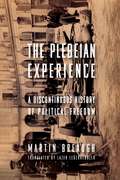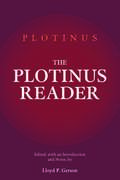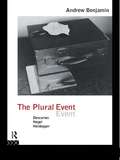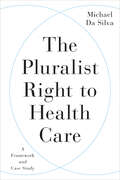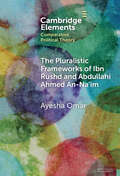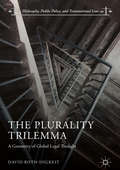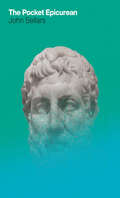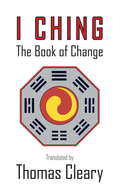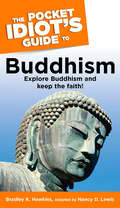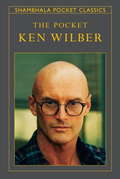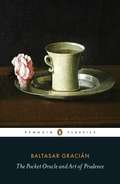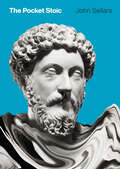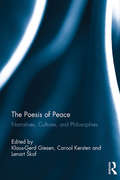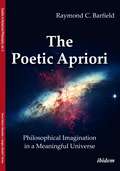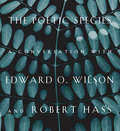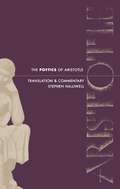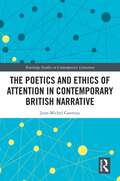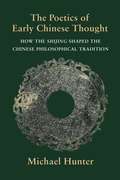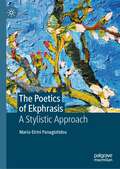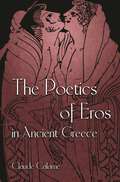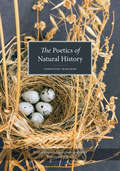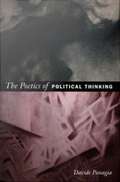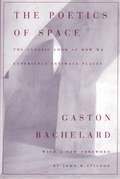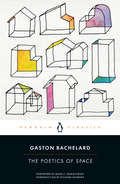- Table View
- List View
The Plebeian Experience: A Discontinuous History of Political Freedom (Columbia Studies in Political Thought / Political History)
by Martin BreaughHow do people excluded from political life achieve political agency? Through a series of historical events that have been mostly overlooked by political theorists, Martin Breaugh identifies fleeting yet decisive instances of emancipation in which people took it upon themselves to become political subjects. Emerging during the Roman plebs's first secession in 494 BCE, the plebeian experience consists of an underground or unexplored configuration of political strategies to obtain political freedom. The people reject domination through political praxis and concerted action, therefore establishing an alternative form of power. Breaugh's study concludes in the nineteenth century and integrates ideas from sociology, philosophy, history, and political science. Organized around diverse case studies, his work undertakes exercises in political theory to show how concepts provide a different understanding of the meaning of historical events and our political present. The Plebeian Experience describes a recurring phenomenon that clarifies struggles for emancipation throughout history, expanding research into the political agency of the many and shedding light on the richness of radical democratic struggles from ancient Rome to Occupy Wall Street and beyond.
The Plotinus Reader (Hackett Classics)
by PlotinusThe Plotinus Reader provides a generous selection of translations from the fifty-four treatises that together make up the Enneads of Plotinus, a central work in the history of philosophy. They were prepared by a team of specialists in ancient philosophy and edited by Lloyd P. Gerson. Based on the definitive critical edition of the Greek along with decades of additional textual criticism by many scholars, these translations aim to provide a readable, accurate rendering of Plotinus&’s often very difficult language. Included are extensive references to Plotinus&’s sources, scores of cross-references, and an extensive glossary of technical terms.
The Plural Event: Descartes, Hegel, Heidegger
by Andrew BenjaminBenjamin provides new and important readings of key canonical texts in the history of philosophy in his sustained philosophical reworking of ontology. Amongst texts included are Hegel's Difference Essay and the Shorter Logic and Heidegger's Time and Being and The Question of Being. The effective presence of ontology, defined as `an original difference', will be familiar to readers of his earlier writings. This book represents his most thorough and original contribution to contemporary philosophy to date.
The Pluralist Right to Health Care: A Framework and Case Study
by Michael DaSilvaHealth rights are a common but controversial legal phenomenon. Every country is signatory to a treaty that incorporates health rights, yet existing health rights do not fit easily into the traditional "claim right" model, and questions remain over how to theoretically incorporate health rights into domestic systems. The Pluralist Right to Health Care addresses this incongruity between theory and practice with an account of the right to health care that is both philosophically and practically sound. Utilizing a pluralist framework, Michael Da Silva argues that the right to health care is best understood as a set of claims to related ends: the goods necessary for a dignified existence, procedural fairness in determining what other goods to provide and in the provision of goods, and a functioning health care system. Through philosophical reasoning, analysis of relevant international human rights law, and a close study of the Canadian case, The Pluralist Right to Health Care provides crucial insight into the potential of law and policy to improve health care systems in Canada and beyond.
The Pluralistic Frameworks of Ibn Rushd and Abdullahi Ahmed An-Na'im (Elements in Comparative Political Theory)
by Ayesha OmarThe purpose of this Element is to analyse the assiduous attempts of two Islamic political thinkers-the 12th century Andalusian philosopher Ibn Rushd and the contemporary Sudanese reformist Abdullahi Ahmed An-Na'im-to theorise Islamic politics through an approach the author refers to as 'pluralistic frameworks'. A pluralistic framework, is a systematic mediation of Islamic ethics and politics that incorporates extra-Islamic traditions of thought from diverse sources. Pluralistic frameworks selectively and self-consciously enable dialogue, synthesis, and hybridity and seek to maintain a distinct conception of Islamic ethics that concords with a preferred set of political arguments. They enable reflexivity within the ethical purview of Islam and with an awareness of the normativity of sharī'a.Both Ibn Rushd and An-Na'im reconcile sharī'a in two very different ways, but to a common end; Ibn Rushd lays out a method of harmonisation with Greek thought, while An-Na'im resorts to the radical subversion of sharia under liberal thought.
The Plurality Trilemma
by David Roth-IsigkeitThis book provides a comprehensive introduction to global legal thought. It argues that economic globalization and digitalization have induced significant insecurity about the future of human social organization. While traditional international law as a system based on the consent of national states is in the process of rapid adaptation to its new social preconditions, a variety of transnational regulatory levels compete for legal authority. In this process of change, there is more need than ever to guide the theoretical understanding because academic concepts have a crucial influence on the emerging practice of global law. This book highlights which choices are available and argues that global law requires taking a stand in mutually irreconcilable choices.
The Pocket Epicurean
by John SellarsA short, smart guide to living the good life through the teachings of Epicurus. As long as there has been human life, we’ve searched for what it means to be happy. More than two thousand years ago, the Greek philosopher Epicurus came to his own conclusion: all we really want in life is pleasure. Though today we tend to associate the word “Epicurean” with indulgence in the form of food and wine, the philosophy of Epicurus was about a life well lived even in the hardest of times. As John Sellars shows in this concise, approachable guide, the ideal life envisioned by Epicurus and his followers was a life much more concerned with mental pleasures and the avoidance of pain. Their goal, in short, was a life of tranquility or contentment. In The Pocket Epicurean Sellars walks us through the history of Epicureanism, starting with the private garden on the edge of ancient Athens where Epicurus and his students lived in the fourth century BC, and where women were as welcome as men. Sellars then moves on to ancient Rome, where Epicurean influence flourished thanks to the poet Lucretius and his cohort. Throughout the book, Sellars draws on the ideas of Epicurus to offer a constructive way of thinking about the pleasures of friendship and our place in the world.
The Pocket Epicurean
by John SellarsA short, smart guide to living the good life through the teachings of Epicurus. As long as there has been human life, we’ve searched for what it means to be happy. More than two thousand years ago, the Greek philosopher Epicurus came to his own conclusion: all we really want in life is pleasure. Though today we tend to associate the word “Epicurean” with indulgence in the form of food and wine, the philosophy of Epicurus was about a life well lived even in the hardest of times. As John Sellars shows in this concise, approachable guide, the ideal life envisioned by Epicurus and his followers was a life much more concerned with mental pleasures and the avoidance of pain. Their goal, in short, was a life of tranquility or contentment. In The Pocket Epicurean Sellars walks us through the history of Epicureanism, starting with the private garden on the edge of ancient Athens where Epicurus and his students lived in the fourth century BC, and where women were as welcome as men. Sellars then moves on to ancient Rome, where Epicurean influence flourished thanks to the poet Lucretius and his cohort. Throughout the book, Sellars draws on the ideas of Epicurus to offer a constructive way of thinking about the pleasures of friendship and our place in the world.
The Pocket I Ching: The Book of Change
by Thomas ClearyThe I Ching (Book of Change) is considered the oldest of the Chinese classics, and has throughout Chinese history commanded unsurpassed prestige and popularity. Containing several layers of text and given numerous levels of interpretation, the I Ching has been venerated for more than three thousand years as an oracle of fortune, a guide to success, and a source of wisdom. The underlying theme of the text is change, and how this fundamental force influences all aspects of life--from business and politics to personal relationships. This translation of the I Ching draws on ancient Confucian commentary, which emphasizes applying practical wisdom in everyday affairs.
The Pocket Idiot's Guide to Buddhism: Explore Buddhism and Keep the Faith!
by Nancy Lewis Bradley HawkinsYou&’re no idiot, of course. You know many people have turned to Buddhism as an alternative to organized religion—but you&’re mistaken if you believe that all Buddhists live a monklike existence. Don&’t wait until your next life to experience Zen! The Pocket Idiot&’s Guide® to Buddhism reveals the essence of Buddhist thought from its inception in the Far East to its growing devotees in the West. In this Pocket Idiot&’s Guide®, you get:• The life of Siddhartha—better known as the Buddha—the founder of Buddhism. • The basic Buddhist belief system, including the Three Marks of Existence, the Four Noble Truths, and the Eightfold Path. • Fully explained concepts, such as Zen, karma, dharma, and sutras. • The history of the various Buddhist sects and their important influence.
The Pocket Ken Wilber
by Ken WilberKen Wilber--the author of over twenty books of philosophy and psychology--is a pioneering thinker who has developed an integral "theory of everything" that embraces the truths of both Eastern spirituality and Western science. The Pocket Ken Wilber highlights the personal wisdom of this popular author with short selections of inspirational and mystical passages drawn from his publications. These heartfelt writings include poetic passages of contemplative insights and reflections as well as inspired descriptions of Spirit, Nondual Awareness, the Witness, One Taste, and other topics.
The Pocket Oracle and Art of Prudence
by Baltasar GraciánWritten over 350 years ago, The Pocket Oracle and the Art of Prudence is a charming collection of 300 witty and thought-provoking aphorisms. From the art of being lucky to the healthy use of caution, these elegant maxims were created as a guide to life, with further suggestions given on cultivating good taste, knowing how to refuse, the foolishness of complaining and the wisdom of controlling one's passions. Baltasar Gracian intended that these ingenious aphorisms would encourage each reader to challenge themselves both in understanding and applying each axiom.
The Pocket Stoic (Chicago Visions and Revisions)
by John SellarsTo counter the daily anxieties, stress, and emotional swings caused by the barrage of stimuli that plagues modern life, many people have been finding unexpected solace in a philosophy from a very different and distant time: Stoicism. Today, more than 100,000 people are members of online communities for modern Stoics, and there are annual conferences, meet-ups, and workshops for those aspiring to walk the Stoic path. But what is Stoicism, and what makes it resonate so powerfully today? As John Sellars shows in The Pocket Stoic, the popular image of the isolated and unfeeling Stoic hardly does justice to the rich vein of thought that we find in the work of Seneca, Epictetus, and Marcus Aurelius, the three great Roman Stoics. Their works are recognized classics, and for good reason—they speak to some of the perennial issues that face anyone trying to navigate their way through life. These writings, fundamentally, are about how to live—how to understand your place in the world, how to cope when things don’t go well, how to manage your emotions, how to behave toward others, and finally, how to live a good life. To be a Stoic is to recognize that much of the suffering in your life is due to the way you think about things, and that you have the ability to train your mind to look at the world in a new way—to recognize what you can and cannot control and to turn adversity into opportunity. Concise and accessible, The Pocket Stoic provides a welcome introduction to the lives and thought of the key Stoics. It is also a perfect guide to help you start incorporating the practice of Stoicism into your everyday approach to life.
The Poesis of Peace: Narratives, Cultures, and Philosophies
by Lenart Škof Carool Kersten Klaus-Gerd GiesenExploring the relations between the concepts of peace and violence with aesthetics, nature, the body, and environmental issues, The Poesis of Peace applies a multidisciplinary approach to case studies in both Western and non-Western contexts including Islam, Chinese philosophy, Buddhist and Hindu traditions. Established and renowned theologians and philosophers, such as Kevin Hart, Eduardo Mendieta, and Clemens Sedmak, as well as upcoming and talented young academics look at peace and non-violence through the lens of recent scholarly advances on the subject achieved in the fields of theology, philosophy, political theory, and environmentalism.
The Poetic Apriori: Philosophical Imagination in a Meaningful Universe (Studies in Historical Philosophy #2)
by Raymond C. BarfieldTheories about the nature and function of philosophical imagination depend on our understanding of what kind of universe we inhabit. Some theories are compelling if the universe is meaningful as a whole, but they make no sense if it is not. Raymond C. Barfield discusses conditions that would be necessary if the universe is meaningful as a whole, and then develops a theory of philosophical imagination in light of that starting place. The theory moves toward the conclusion that if the universe is meaningful as a whole, the concept of the analogia entis, the analogy of being, illuminates philosophical imagination in a way that changes our understanding of its function and potential, along with the value of its discoveries through the things it creates.
The Poetic Species
by Edward O. Wilson Robert Hass Lee Briccetti"Wilson brilliantly analyzes the force, at once creative and destructive, of our biological inheritance and daringly advances a grand theory of the origins of human culture." -STEPHEN GREENBLATT, author of The Swerve on Edward O. Wilson's The Social Conquest of Earth"Hass [is] a philosophically attentive observer, deep thinker, and writer who dazzles and rousts." -Booklist on Robert Hass' What Light Can DoIn this shimmering conversation (the outgrowth of an event co-sponsored by the American Museum of Natural History and Poets House), Edward O. Wilson, renowned scientist and proponent of "consilience" or the unity of knowledge, finds an ardent interlocutor in Robert Hass, whose credo as U.S. poet laureate was "imagination makes communities." As they explore the many ways that poetry and science enhance each other, they travel from anthills to ancient Egypt and to the heights and depths of human potential. A testament to how science and the arts can join forces to educate and inspire, it ends in a passionate plea for conservation of all the planet's species.Edward O. Wilson, a biologist, naturalist, and bestselling author, has received more than 100 awards from around the world, including the Pulitzer Prize. A professor emeritus at Harvard University, he lives in Lexington, Massachusetts.Robert Hass' poetry is rooted in the landscapes of his native northern California. He has been awarded the MacArthur "Genius" Fellowship, the National Book Critics Circle Award (twice), the Pulitzer Prize, and the National Book Award. He is a professor of English at University of California-Berkeley.
The Poetics Of Aristotle: Translation And Commentary
by Stephen HalliwellIncorporating the best modern work on the Poetics, Halliwell's translation is aimed at those who want a reliable version of Aristotle's ideas along with concise and stimulating guidance. <P><P> A running commentary explains the structure and detail of Aristotle's argument, attempts to provoke further thought about the work's strengths and weaknesses, and offers suggestions on relating the Poetics to later stages of literary theory and practice.
The Poetics and Ethics of Attention in Contemporary British Narrative (Routledge Studies in Contemporary Literature)
by Jean-Michel GanteauThis book uses attention as a prism through which to interrogate the literary text. It starts from analyses of the changes that the mediasphere and communication technologies have brought for the contemporary subject, submitting him/her to the tyranny of a new attention economy. My point is that the contemporary novel and memoir resist such influences and evince a great deal of resilience by promoting an "ecology of attention" (Citton) based on poetic options whose pragmatic effect is to develop an ethics of the particularist type. To do this, I draw on critical and theoretical literature hailing from various fields: psychology, but also more prominently phenomenology, political philosophy, and analytical philosophy (essentially Ordinary Language Philosophy), alongside the ethics of care and vulnerability. By using a selection of fictional and non-fictional narratives, I address such issues as social invisibilities, climate change, AI and cognitive disability and end up drafting a poetics of attention.
The Poetics of Early Chinese Thought: How the Shijing Shaped the Chinese Philosophical Tradition
by Michael HunterThe modern imagination of classical Chinese thought has long been dominated by Confucius, Mozi, Mencius, and other so-called “Masters” of the Warring States period. Michael Hunter argues that this approach neglects the far more central role of poetry, and the Shijing (Classic of Poetry) in particular, in the formation of the philosophical tradition. Through a new reading of its ideology and poetics, Hunter reestablishes the Shijing as a work of major intellectual-historical significance. The Poetics of Early Chinese Thought demonstrates how Shi poetry weaves a vision of society united at every level by the innate and universal impulse to come home. The Shi immersed early thinkers in a world of movement and flow in order to teach them that the most powerful current of all was the gravitational pull of a virtuous king, without whom people can never truly feel at home. Hunter traces the profound influence of the Shi ideology across numerous sources of classical Chinese thought, which he recasts as a network centered on the Shi. Reframing the tradition in this way reveals how poetry shaped ancient Chinese thinkers’ conception of the world and their place within it.This book offers both a sweeping critique of how classical Chinese thought is commonly understood and a powerful new way of studying it.
The Poetics of Ekphrasis: A Stylistic Approach
by Maria-Eirini PanagiotidouThis book provides a stylistic and cognitive poetic account of ekphrastic poetry (poetry whose subject matter is predominantly artworks and images), examining the linguistic processes through which works of art can become literary objects. The author sheds light on the workings of ekphrasis at a textual level, while also considering the cognitive and psychological effects of reading ekphrastic poems, developing cognitive and stylistic analytical frameworks grounded on the four principles that govern ekphrasis: representation, narrativization, transposition, and collaboration. This book will be of interest to academics and practitioners in various fields, including literary critics, art critics, rhetoricians, poets, visual artists, and stylisticians.
The Poetics of Eros in Ancient Greece
by Claude CalameThe Poetics of Eros in Ancient Greece offers the first comprehensive inquiry into the deity of sexual love, a power that permeated daily Greek life. Avoiding Foucault's philosophical paradigm of dominance/submission, Claude Calame uses an anthropological and linguistic approach to re-create indigenous categories of erotic love. He maintains that Eros, the joyful companion of Aphrodite, was a divine figure around which poets constructed a physiology of desire that functioned in specific ways within a network of social relations. Calame begins by showing how poetry and iconography gave a rich variety of expression to the concept of Eros, then delivers a history of the deity's roles within social and political institutions, and concludes with a discussion of an Eros-centered metaphysics. Calame's treatment of archaic and classical Greek institutions reveals Eros at work in initiation rites and celebrations, educational practices, the Dionysiac theater of tragedy and comedy, and in real and imagined spatial settings. For men, Eros functioned particularly in the symposium and the gymnasium, places where men and boys interacted and where future citizens were educated. The household was the setting where girls, brides, and adult wives learned their erotic roles--as such it provides the context for understanding female rites of passage and the problematics of sexuality in conjugal relations. Through analyses of both Greek language and practices, Calame offers a fresh, subtle reading of relations between individuals as well as a quick-paced and fascinating overview of Eros in Greek society at large.
The Poetics of Natural History: From John Bartram To William James
by Christoph IrmscherEarly American naturalists assembled dazzling collections of native flora and fauna, from John Bartram’s botanical garden in Philadelphia and the artful display of animals in Charles Willson Peale’s museum to P. T. Barnum’s American Museum, infamously characterized by Henry James as “halls of humbug.” Yet physical collections were only one of the myriad ways that these naturalists captured, catalogued, and commemorated America’s rich biodiversity. They also turned to writing and art, from John Edward Holbrook’s forays into the fascinating world of herpetology to John James Audubon’s masterful portraits of American birds. In this groundbreaking, now classic book, Christoph Irmscher argues that early American natural historians developed a distinctly poetic sensibility that allowed them to imagine themselves as part of, and not apart from, their environment. He also demonstrates what happens to such inclusiveness in the hands of Harvard scientist-turned Amazonian explorer Louis Agassiz, whose racist pseudoscience appalled his student William James. This expanded, full-color edition of The Poetics of Natural History features a preface and art from award-winning artist Rosamond Purcell and invites the reader to be fully immersed in an era when the boundaries between literature, art, and science became fluid.
The Poetics of Political Thinking
by Davide PanagiaIn The Poetics of Political Thinking Davide Panagia focuses on the role that aesthetic sensibilities play in theorists' evaluations of political arguments. Examining works by thinkers from Thomas Hobbes to Jacques Rancire, Panagia shows how each one invokes aesthetic concepts and devices, such as metaphor, mimesis, imagination, beauty, and the sublime. He argues that it is important to recognize and acknowledge these poetic forms of representation because they provide evaluative standards that theorists use in appraising the value of ideas--ideas about justice, politics, and democratic life. An investigation into the intertwined histories of aesthetic and political accounts of representation--such as Panagia presents here--sheds light on how modes of poetic thinking delimit the questions of unity and diversity that continue to animate contemporary political theory. Panagia not only illuminates the structure of much contemporary political theory but also shows why understanding the poetics of political thinking is vital to contemporary society. Drawing on Gilles Deleuze's critique of negation and his privileging of paradox as the source of political thought, Panagia suggests that a non-teleological concept of difference might generate insight into pressing questions about foreignness and citizenship. Turning to the liberal/poststructural debate that dominates contemporary political theory, he compares John Rawls's concept of justice to Rancire's ideas about political disagreement in order to demonstrate how, despite their differences, both thinkers comprehend aesthetic and moral reasoning as part and parcel of political writing. Considering the writings of William Hazlitt and Jrgen Habermas, he describes how the essay has become the exemplary genre of what is considered rational political argument. The Poetics of Political Thinking is a compelling reappraisal of the role of representation within political thought.
The Poetics of Space
by Gaston Bachelard John R. StilgoeThirty years since its first publication in English, French philosopher Gaston Bachelard's The Poetics of Space one of the most appealing and lyrical explorations of home. Bachelard takes us on a journey, from cellar to attic, to show how our perceptions of houses and other shelters shape our thoughts, memories, and dreams.
The Poetics of Space
by Gaston Bachelard Mark Z. Danielewski Richard Kearney Maria JolasA beloved multidisciplinary treatise comes to Penguin ClassicsRare is the work of philosophy that invites both the casual reader and the academic. Rare, too, is the text so universal that luminaries across an array of fields lay claim to it. <P><P>Yet, that is precisely the case with Gaston Bachelard's The Poetics of Space. A rumination on the spaces we inhabit and the dreams and memories that fill them, this seminal work continues to be studied and enjoyed by philosophers, architects, writers, and literary theorists alike.This new edition features a foreword by Mark Z. Danielewski, whose bestselling novel House of Leaves drew inspiration from Bachelard's writings, and an introduction by internationally renowned philosopher Richard Kearney who explains the book's enduring importance and its role within Bachelard's remarkable career.For more than sixty-five years, Penguin has been the leading publisher of classic literature in the English-speaking world.
